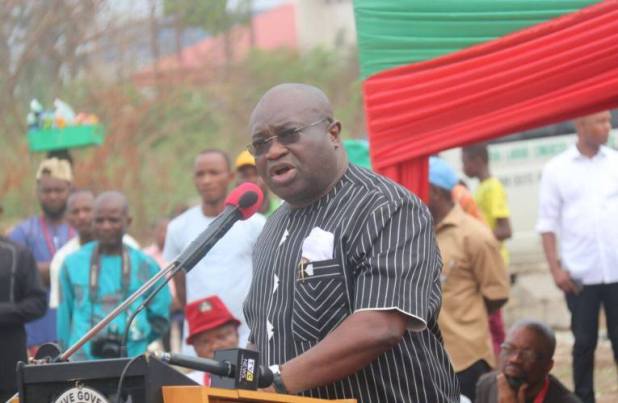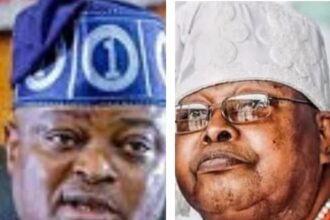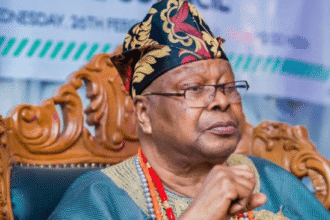Abia State Gov. Okezie Ikpeazu and other ministries in the state are enmeshed in multi-billion naira budget scandal, ENigeria Newspaper reports. Analysis of the 2020 Report of Accountant General with Financial Statements of the Abia State Government has exposed questionable extra-budgetary expenditures in the Office of the governor, deputy governor, ministries of environment and solid minerals, and the state’s environmental protection agency
Checks into the report also uncovered illegal loan procurement above N11bn by the Abia State Government. The total extra spending by these four offices exceeds N14bn. N1.4bn Spent on Vehicles in one year The accountant general’s report reveals that the Governor’s Office purchased an unspecified number and undisclosed brands of vehicles for Government House and Ministries, Departments and Agencies, MDAs, for N1.4bn in 2020, the year of the COVID-19 pandemic outbreak. In the breakdown, tagged “Purchase of motor vehicles for Government House and MDAs”, the report showed that N1.2bn was spent on the item instead of N231m appropriated in the revised budget. Thus, the Governor Office spent extra N969m vehicles without appropriation or approval by the state legislature. Although N10m was approved for acquiring capital assets (purchase of vehicles and other capital assets)in the Governor’s Office, the office ended up spending an extra N24.2m on the same item without due appropriation.
In a separate expenditure, the state government claimed it spent N206m to purchase buses for government and other MDAs when only N154m was the approved sum, meaning that N52m was spent above the budget ceiling. The quantity and brand of these buses bought are vague, leaving little room for accountability. Efforts to know the brand, quantity of the vehicles purchased and how much was expended on each; invoice on the procurement; list of bidders for the procurement of the motor vehicles; contract approval letter for the procurement of the motor vehicles and names of benefitting MDAs and quantity given to each MDAs, through a Freedom of Information Act (FOIA) request to the offices of the governor, Commissioner for Finance, and Accountant General were unsuccessful as they did not respond to the application. These three offices could not explain and provide evidence on how the money for the items was spent despite repeated attempts.
For instance, this newspaper twice paid a visit to the Commissioner for Finance, Aham Uko, on August 17 and 30 but was told he was not available. He also did not respond to calls and text messages to his know phone number. Findings showed that the amount spent on these items is three times higher than what was spent in the preceding fiscal year. In 2019, a total of N413m was spent on these same items. This is slightly higher than the N395m that was budgeted in the 2020 revised budget. In the 2021 Appropriation Act, the state government budgeted N1.8bn for the purchase of vehicles. This amount is two times higher than the N473m capital expenditure to the entire health sector of the state in 2020 despite the prevalence of the Coronavirus pandemic. For instance, the Ministry of Health, Abia State Health Insurance Agency, Abia State Primary Health Care Development Agency, Abia State University Teaching Hospital, Abia State College of Health Science and Management Technology, Aba, Abia State Specialists Hospital and Diagnostic Centre, Abia State Hospitals Management Board and Abia State Agency for the Control of HIV/AIDS collectively shared N473m in 2020 fiscal year. N902m Splurged on Power Generating Set, Two other Purchases The Governor’s Office also procured a power generating set for the Government House and Liaison Office with N640m against the N55M approved in the 2020 budget. This implies that the office splurged N585m on this item without due recourse to the Appropriation Act. This amount (N585m) is higher than the entire capital expenditure for the state’s education sector in the same year (2020). This amount (N585m) is higher than the entire capital expenditure for the state’s education sector in the same year (2020).
In 2020, the State Ministry of Education, Abia State Universal Basic Education Board (ASUBEB), Abia State Library Board, Abia State Agency for Mass Literacy, Abia State Polytechnic, Aba, Abia State College of Education, Arochukwu, Abia State University, Uturu, Secondary Education Management Board, Abia State Scholarship Board, Examination Development Centre, and Abia State Continuing Teachers Training Centre, got a combined allocation of N519.7m. The flagrant disregard of the Appropriation Act did not stop there. The Governor’s Office spent N49.2m outside of the approved budget on the “provision of sporting facilities at new Governor’s Lodge”. This amount is 23 times higher than the total capital releases made to the Ministry of Agriculture, which stood at paltry N2m out of its N1.5bn budget.
Furthermore, the office retired N255.2m for the “purchase of health/medical equipment for government house clinic”, even though N119.1m was the approved amount for the item. Through a Freedom of Information (FOI) request, our reporter sought information from the Office of the Governor, finance ministry, and Accountant-General of the state on the brand and quantity of generating set, the titles and quantity of the sporting facilities, titles and quantity of the medical equipment, invoices for the procurement, list of bidders for the procurement, and the contract approval letters for the procurements. These offices did not accede to the request. A follow-up reminder sent to the offices at the expiration of seven working days provided for in the Freedom of Information Act (FOIA) was further greeted with silence. Meanwhile, sources in Government House who cannot be named in this report for fear of victimization disclosed that no new generating sets were purchased as the ones used in Government House are still functional. N2.2bn spent on the governor’s welfare.
Another curious extra-budgetary spending in the Governor’s Office was for “welfare packages”, where a whooping N2.2bn was spent against N1.5bn budgeted. This spending left a variance of N700m from what was budgeted. A Freedom of Information Act (FOIA) request, with a reminder that sought information from the Office of the Governor, Ministry of Finance, and Accountant General on what these welfare packages entailed, was greeted with silence. The N700m extra spent on the governor’s welfare is seven times higher than the total capital expenditure of three ministries combined – Ministry of Women Affairs; Ministry of Small and Medium Enterprises Development; and Ministry of Youth Development. In 2020, the women affairs and social development ministry had a capital release of N13m; small and medium enterprises development ministry got N9.8m while the capital release for youth development ministry stood at N66m, totaling N88.8m. What is more, the N2.2bn retired as the governor’s welfare package is about the total of two months internally generated revenue (IGR) in the state. According to the Abia State Accountant General report, the state generated only N15.9bn internal revenue in 2020. [Though, the state IGR, according to NBS, is N14.4 billion]. Meanwhile, checks into the state’s financial statements over the years reveal a trend of billions of naira retired through this subhead. For instance, in 2019, the state spent above what was approved on this same item (governor’s welfare). N3.5bn was spent instead of the N1.1bn approved. A year before that (2018), N3.2bn was spent.
International and local travels gulped N734.6m The 2020 financial report also exposed arbitrary and questionable recurrent expenditure by the Governor’s Office on local and international travel. According to the report, the office retired N176m for “international transport and travel-training” against the N100m that was budgeted. Yet, another N4.6m was recorded as cost for “international training” against the N3m approved. N1.6m was entered as out-of-budget expenses. The same office also spent N386.4m instead of the approved budget of N370m on “local transportation, travel, and training”. An additional N16.4m was put up as out-of-budget expenses. That was not all. More money was again retired for local travels under different subheads. For “local transport, travel-others”, the Governor’s Office spent N166m against the N104m approved. Also, N62m was posted as optional spending. The office spent N1.6m against N1.2m approved for ” local training” while N400,000 was recorded as the additional cost.
Through a FOIA request, our reporter sought information from the Office of the Governor, finance ministry and accountant-general, on the date and location of the international and local travels and training, the title of training, category, and list of trainees, and invoices of travel expenses. These requests were not acceded to, and reminders sent to these offices at the expiration of seven working days provided for in the FOIA were further greeted with silence. The Governor’s Office’s claims that funds were spent on international travels in a year where international flights were restricted for a larger part of the year due to Covid-19 lockdown and protocols leave more questions unanswered. Due to Covid-19 protocols, most trainings during the fiscal year were done virtually; thus, the spending on local travels for training is a red flag. N2.1bn spent on maintenance and servicing of Governor’s Office Further analysis of the 2020 annual report reveals other recurrent discretionary expenses amounting to N2.1bn. For instance, N149.2m was spent on “Maintenance of motor vehicles/transportation equipment” against the N97m approved. Maintenance of office building and residential quarters gulped an extra N17m more than N214.2m budgeted. Other maintenance services cost the state N30m instead of the N5.1m budgeted. Foodstuff and catering materials supplies were not left out. The item gulped N411m instead of the N263m budgeted. Other extra-budgetary expenditures by the office include; N695.1m on consolidated revenue fund charges – salaries; N29.4m on office stationeries and computers consumables; N12m on medical expenses; N6.2m on plant and generator fuel cost; N2.8m on uniforms and other clothing; N2.3m on internet access charges; N1.6m on printing of security documents; N1.4m on printing of non-security documents; N500,000 on leased communications lines and N400,000 on magazine and periodicals. It is also striking to note that the Accountant General’s report stated that N67.7m was spent on security services, whereas the item was not provided for the 2020 revised budget. Deputy Governor follows in the Governor’s footsteps Despite deputy governor, Ude Chukwu’s experience as a two-term lawmaker and former Speaker, Abia State House of Assembly, his office is also caught up in the web of arbitrary spending. Prominent items the deputy governor spent beyond budgetary approval include his basic salary, security votes, and refreshment, and meal. The Accountant-General’s report revealed that although N74m was approved as the basic salary of Chukwu for the year 2020, he received N133.7m. Despite allocating N402m as security votes (including operation), Chukwu’s office got N443m. For refreshment and meals, the report says the office spent N33m more than the approved sum of N2m.
Questionable expenditure in some MDAs According to the report of the Accountant General, under the Ministry of Environment and Solid Minerals, N165m was budgeted for Nigeria Erosion & Watershed Management Project (NEWMAP), but N11.8bn was eventually expended. This leaves an extra-budgetary retirement of N11.6bn. Interestingly, checks into the report showed that in 2019, N12.1bn against N1bn approved in the budget was spent on this same agency through the ministry. In that year, over N11bn was without recourse to the Appropriation Act. NEWMAP is a world bank-assisted project aimed at addressing the Nigerian gully erosion crisis. Projects embarked upon by NEWMAP are carried out by the Federal Government after payment of counterpart funding by the state. Freedom of Information (FOI) requests to the environment and solid minerals ministry, finance ministry, and Accountant General’s Office regarding titles and locations of projects handled by NEWMAP for the 2020 fiscal year, detailed explanation on the cost, and invoices were initially greeted with silence until a reminder was sent at the expiration of the seven days provided by the Act. In a letter dated August 31, 2021, and signed by Onyekwere Eze on behalf of the permanent secretary of the environment and solid minerals ministry, he said that the matter should be directed to the Secretary to the State Government (SSG). The letter reads: “I am directed to acknowledge the receipt of your letters dated August 16th and 30th, 2021 on the above subject and observe that matters like this are routed through the office of the Secretary to the State Government as a formal channel. ”The ministry further denied knowledge of the expenditure, claiming not to know where such information or report was gotten. By the letters of the FOI Act 2011, if the environment and solid minerals ministry determined that the information sought is domiciled with another ministry, it has the responsibility to transfer the request to the concerned ministry, not the journalist. This was pointed out to the Ministry on August 31, 2021, but it is yet to reply as of the time of filing this report. However, a source in the ministry who cannot be named in this report for safety reasons disclosed that it is ignorant of the referenced expenditure. The source, a senior management staff of the ministry, said: “We are not aware of that amount of money. Although we work with NEWMAP, we are not the one that spends when it comes to money. In fact, we have never seen such an amount of money in this ministry, even in the past five years. Maybe someone just had to retire the money through our ministry”. Earlier, when The Mail Newspaper reached out to the state coordinator of NEWMAP, Ezuchukwu Onwughara, an engineer, concerning the issue, he denied that his agency received N11.8bn for any project from the state government. “What you are saying is wrong, total fallacy, and vexatious that the state government had given NEWMAP N11 billion.” Asked to give insight into the agency’s activities and projects in 2020, Onwughara said: “We don’t have projects for 2021. What we have are projects rolled from 2019 to 2020”. However, he declined to give details of the agency’s expenditure. He said the Secretary to the State Government must clear such communication. “Projects in NEWMAP are under the Ministry of Environment and Solid Minerals. We are aware that The Mail Newspaper has written to the Ministry of Environment seeking information on NEWMAP. The Permanent Secretary has minuted the letter and has gone to liaise with the SSG. Even if I received that letter, I have to follow that line of communication. I have seen that letter, and I know that that process has been initiated.” Abia State Environmental Protection Agency not left out The Abia State Environmental Protection Agency (ASEPA) is not left out. The agency spent N584 million against N303 million budgeted on “rapid response to environmental intervention and emergencies”. In the same vein, it retired N423 million for the “Establishment of Refuse Dumpsite and landfill at Aba and Umuahia”, whereas N300 million was the approved budget. FOIA requests to the agency, Ministry of Finance, and Accountant General’s Office requesting for the actual locations of projects in the locations mentioned, cost of each of the projects, list of bidders for the project, contractors for each of the project and contract approval letters for the project was neither responded to nor acknowledged. Same with the reminder sent at the expiration of seven working days provided for in the Act. Illegal N11.6bn loan acquisition Further analysis of the Accountant General’s report revealed that out of N15.5bn approved in the 2020 revised budget for external and internal loans, the state overshoot this by N5.4bn at the end of the fiscal year. The breakdown of how the loans were acquired, however, revealed some discrepancies. The report says that loans obtained from commercial banks tagged as “internal loans” amounted to N20.9bn against N9.3bn approved. This implies that N11.6bn loan was sourced without necessary approval by the state assembly. Foreign loans otherwise tagged as “external loans” taken for the year stood at N18.9m against N6.3bn approved by the assembly. Still, in 2020, the report also pointed out that the Abia State government spent a total of N19.4bn on her public debt charges. The discretionary loan acquisition by the executive is in breach of the Abia State Debt Management Office law (2020), Section 21 (2) of which provides for the powers of the House of Assembly in approval of all loans of the state. “No agreement in respect of which the approval of the House of Assembly is required shall come into operation without such approval,” the Section reads. Nevertheless, this is not the first time the state has exceeded its approved loan acquisition limit. The revised budget for the 2019 fiscal year shows that N2.3bn was the approved internal loan for 2019 while N9.5bn was the approved external loan for the year, thus totalling N11.8bn. But the 2019 Financial Statements shows that the state ended up obtaining N25bn internal loan. No external loan was taken. This left an extra-budgetary loan acquisition of N13.2bn in 2019. According to the December 31, 2020 report of the Debt Management Office, Abuja, the total debt burden of Abia State stands at N125.9bn. This ranks the state 8th most indebted state in the oil-rich Niger Delta and 19th among the 36 states and Federal Capital Territory, FCT. Spiral of silence from Abia State Government Besides not responding to FOIA requests for key documents and information required for this investigation, the Abia State Commissioner for Finance, Aham Uko, did not respond to several calls put through to his known phone line. He did not also respond to text messages sent to him for clarifications throughout the duration of this investigation. The text message specifically asked him to give insight into what may have warranted the extra-budgetary spending and loan acquisition incurred during the fiscal year. Also, the offices of Governor and Deputy Governor, Accountant General, and General Manager, Abia State Environmental Protection Agency, did not respond to FOIA requests for invoices and clarifications during the period of this investigation. The Ministry of Environment and Solid Minerals evaded response by referring the newspaper to the Secretary to the State Government. The Mail Newspaper made more attempts to reach the General Manager, Abia State Environmental Protection Agency, Eze Okwulehie, on the phone. He did not respond to several calls to his known phone line or text and WhatsApp messages sent to him between August 26 and September 2. The messages specifically requested explanations for extra-budgetary expenditure on items earlier mentioned in this report. The Nigerian 1999 Constitution, as amended in Section 120 (4), states that “No money shall be withdrawn from the Consolidated Revenue Fund of the State or any other public fund of the State except in the manner prescribed by the House of Assembly.” “We just received the report”- House of Assembly The Abia State House of Assembly has yet to consider the audit report and investigate the grey areas. The assembly has been on recess in the course of this investigation. Nevertheless, efforts to reach the Chairman, House Committee on Finance and Appropriation, Kennedy Njoku, whose committee has oversight powers over the Ministry of Finance, for comment were futile. He did not respond to his calls throughout the duration of this investigation. Text and WhatsApp messages sent to him received neither acknowledgment nor reply. The messages sent to him specifically asked if his committee received or considered the Accountant-General’s report, what had been done about the extra-budgetary spending and illegal loan acquisition, or what the legislative house planned to do. After several unsuccessful attempts to reach the Chairman, House Committee on Public Accounts, Anti-Corruption and Due Process, Jerry Uzosike, whose committee is mandated under Section 125 (5) of the 1999 Constitution as amended to receive and consider the audited financial statement of the state, he finally responded to our questions on September 2, 2021, via a text message. He wrote: “We just received the audit report, and the consideration by the committee is starting next week, and I think after the considerations, the report will be laid at the floor of the house for public consumption. Thank you for your understanding.” The lawmaker did not respond to a further message on the exact date the audit report was presented to the House. Auditor-General found wanting Section 125 (2) of the 1999 Constitution as amended gives the Auditor-General of the State the responsibility to conduct preliminary oversight after the Accountant General presents government expenditures. The section states: “The public accounts of a State and all offices and courts of the State shall be audited by the Auditor-General for the State who shall submit his reports to the House of Assembly of the State concerned….” Consequent upon this provision, this newspaper, through FOIA request to the office of the Auditor-General, specifically asked for a detailed audit report including his observations and recommendations on the projects and items considered in this investigation. The Office of the Auditor-General failed to respond to the letter. Auditor-General also personally declined to receive a reminder sent to his office. He, however, assured this newspaper verbally that his office would act on the request. When the Auditor-General was eventually reached, he noted that when his office considers the report of the Accountant General, erring ministries would be highlighted. The report would be sent to the House of Assembly for consideration. “We will consider the report. The 2020 report you have mentioned has not been considered in the House of Assembly. It is after the consideration that it can now be open for public consumption.” When asked whether the Accountant General had submitted the report to his office for consideration, the Auditor-General sounded ambiguous. “That question you are asking me, I have told you that when we finish, we will report to the House. When the Accountant General submit his statement, we will consider it and send it to the House of Assembly. It will not include the details of what you have listed. When this newspaper queried why the Auditor-General has exceeded the 90 days provided by law for his office to present his report to the House of Assembly after receiving that of the Accountant General, he responded: “That question is what I cannot be in the position to answer. This is because once the Accountant General submits, we start counting days. 90 days hold when Accountant General submits the report to us. The House of Assembly is on break now. They have not considered our report. Until they consider it, I cannot answer that question. “We will submit the report when we are ready. We have 90 days. The Accountant General’s Office submitted the report to us sometime in July. Is it up to 90 days?” On whether his office has sighted the extra-budgetary spending, he noted that “the information we have (the office has) will be served at the appropriate quarters.” The Auditor-General’s claim that the 90 days’ time frame is still being respected is rather puzzling. The audit certificate included in the Accountant General’s report, signed by the Auditor-General, is dated May 31, 2021. The certificate notes: “The Accounts and Financial Statements of the Government of Abia State of Nigeria for the financial year ended 31st December 2020 have been examined following section 125 (2) of the 1999 constitution….” When these facts were presented to the Auditor-General, he maintained he was ignorant of it. Section 125 (5) of the 1999 Constitution provides that “The Auditor-General for a State shall, within ninety days of receipt of the Accountant-General’s financial statement and annual accounts of the State, submit his report to the House of Assembly of the State and the House shall cause the report to be considered by a committee of the House responsible for public accounts.” Counting from the date the Auditor-General appended his signature to the Accountant General report, the 90 days elapsed on August 29, 2021. Nwogbia also said he is ignorant of loans acquired by the state government outside of the approved limit by the House of Assembly. “On the loan acquisition, I do not know that until I call my people working on that. Directors and Departmental Heads are working on that. When they report to me, I will note it. Maybe I will draw their attention if there are such things.” Extra-budgetary disbursement and discretionary loan acquisition is a breach of procurement laws – Expert A Professor of Monetary Economics, Public Finance, and Development Economics at the Federal University of Uyo, Uyo, Akwa Ibom State, Prof Emmanuel Onwioduokit, said that the executive does not have powers to spend above what is approved for in the budget. “By the laws of the land, you are not supposed to spend any amount of money without appropriation. To engage in extra-budgetary spending or loan procurement is a criminal offence by the constitution. We also have the Fiscal Responsibility Act, which criminalizes this. “If the executive wants to spend more, or have needed to obtain loan above what was approved, they have to go to the House of Assembly and make a requisition for a supplemental budget and get their approval before they can spend more or get more money. You do not just spend public money at will or put the people in more debt without their approval through their representatives at the parliament”. “To check such spending, most States have domesticated the Fiscal Responsibility Act. So, the Fiscal Responsibility Act and the Constitution, which is superior, is already in place. Therefore, it is important to enforce the law.” In the same vein, the Public and Private Development Centre (PPDC), a civil society organisation working on procurement and promotion of citizens’ participation in the governance process, has called on Abia State citizens to get involved in interrogating the public financial management systems of their state. In an interview with this newspaper, the Chief Executive Officer of PPDC, Nkemdilim Ilo, said: “Getting involved means advocating for open access to publicly held financial information, leveraging published data to ask questions, monitor public projects, and hold state and private actors accountable for every public expenditure incurred. The same kind of accountability we expect from the federal government should also be sought at the state level. “While extra-budgetary spending is a contravention of fiscal responsibility laws, unfortunately, this is no longer shocking information. The absence of institutionalized transparency and accountability mechanisms at the subnational level have been a subject of deliberation for longer than I can count. “Nevertheless, given the recent drive for fiscal transparency and sustainability reforms at the subnational level, it means more work needs to be done by a host of stakeholders, non-state actors, and investigative journalists in pushing for accountable and responsible budgeting and public procurement. “Furthermore, it is heartbreaking to see the low percentage of allocation to critical sectors necessary for the development of any state. One key lesson from 2020 was the importance of a strong infrastructure and personnel-driven health sector. Covid-19 laid bare the absence of basic health infrastructure available to citizens and the humbling effect of avoidable death when the border was closed to both the rich and the poor.” Ilo recommends a strategic approach to build up critical sectors such as health, education, and agriculture through a budgetary system that promotes growth. * This investigation is supported by the John D. and Catherine T. MacArthur Foundation and the International Centre for Investigative Reporting
Source: e-nigeriang.com












